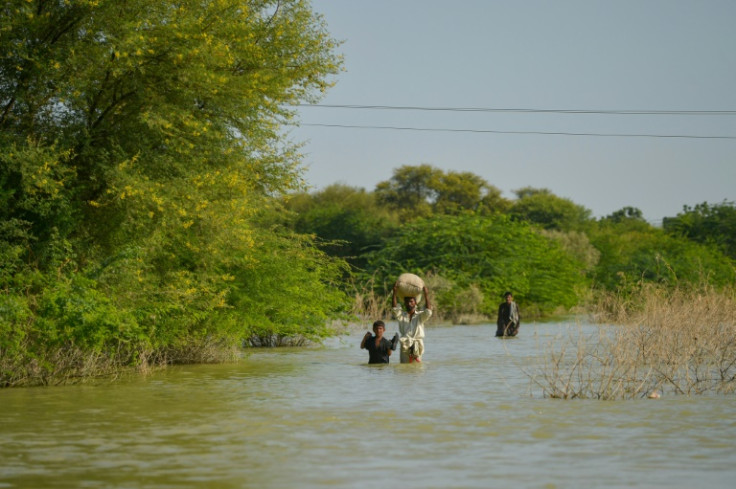76 people dead as monsoon rains again wreak havoc on Pakistan
Last summer, monsoon rains damaged 2 million homes and killed more than 1,700 people in Pakistan.

At least 76 people, including eight children, have been killed in the floods and landslides caused by the monsoon rains in Pakistan.
Pakistan has not yet been able to fully recover from last year's catastrophic floods, and the rains have already begun to wreak havoc on the South Asian country again, per a report by ARY News. As many as 133 people sustained injuries in different rain-related incidents across Pakistan in recent days. Punjab has been the most affected region so far, with 48 reported deaths.
Most of the deaths were caused by electrocution and building collapses, per the data provided by the National Disaster Management Authority. The photos and videos that have gone viral on social media show several places submerged in water after just a few days of rain.
Last summer, monsoon rains damaged 2 million homes and killed more than 1,700 people in Pakistan. The record monsoon rains and melting glaciers led to a disaster of epic proportions in the country.
Multiple experts have blamed climate change for the damage witnessed by the South Asian nation. United Nations Secretary-General Antonio Guterres described the flooding as a "monsoon on steroids" and a "climate catastrophe."
"I have seen many humanitarian disasters in the world, but I have never seen climate carnage on this scale. I have simply no words to describe what I have seen today," he said during his visit to the flood ravaged country last year.
The floods swept away entire villages, bridges, and roads. A third of the country's territory was inundated with water at one point. The authorities are still struggling to get people on their feet.
While monsoon rains killed hundreds of people in countries like Bangladesh and Pakistan last year. Climate change has brought many countries in East Africa to the brink of famine.
A report by the United Nations has said that pollution, extreme weather events, droughts, and floods have affected millions of people across the world. The number of "climate refugees" is only expected to rise if temperatures are not brought under control.
According to a report by the UN's World Meteorological Organisation (WMO), two million people have already been killed by extreme weather, climate, and water-related events since 1970.
Scientists and climate activists have been urging governments to reduce their reliance on fossil fuels such as coal, oil, and gas since these are the major sources of climate-warming greenhouse gas emissions.
"Tragic toll from #Pakistan's #Flooding: 50 dead, 87 injured, and extensive property damage. Torrential rains wreak havoc in #Balochistan province, causing floods and disrupting highways. #Lahore hit hard with record-breaking rainfall.#Islamabad #Turkey #Russia #IMDb #ثريدز pic.twitter.com/CBPYSD9kCv
— Fasihuddin Mohammed (@FasihTaj) July 8, 2023
Climate scientists have warned of the consequences the planet might face if humans do not limit the global temperature rise to 1.5 °C above pre-industrial levels.
Professors Johan Rockstrom of the Potsdam Institute for Climate Impact Research and David King, chair of the Centre for Climate Repair at the University of Cambridge, have said that failure to limit the temperature rise could lead to the collapse of life on the planet.
Months after the #PakistanFloods, those affected are still struggling with access to food. 🌽🍚
— IFRC Asia Pacific (@IFRCAsiaPacific) July 5, 2023
Pakistan Red Crescent, @IFRC, and partners are working tirelessly so people can look forward to long-term food resilience.
Watch what Mayi Pathani, a Pakistani woman says 👇 pic.twitter.com/VLJXc3pkV4
Climate change is causing record-setting temperatures, floods, and droughts to become more frequent. The UN's Intergovernmental Panel on Climate Change indicates that crossing the 1.5C threshold risks unleashing far more severe climate change impacts, including more frequent and severe droughts, heatwaves, and rainfall.
In pictures: At least six people killed after heavy monsoon rains cause flash floods in Pakistan's Lahore pic.twitter.com/ETrCBB081f
— TRT World Now (@TRTWorldNow) July 5, 2023
The planet is already 1.2°C warmer than in pre-industrial times. In order to limit global warming to 1.5ºC, greenhouse gas emissions must peak before 2025 at the latest and decline by 43 percent by 2030.
It said that Earth's average temperature will hit the 1.5ºC threshold around 2030, a decade earlier than projected only three years ago. The UN has urged the world to stop global warming.
South Asian countries like Pakistan, India, and Bangladesh are some of the most vulnerable to extreme weather caused by global warming and climate change. If the rising temperatures are not brought under control, extreme weather events will only become more frequent and catastrophic.
© Copyright IBTimes 2025. All rights reserved.






















